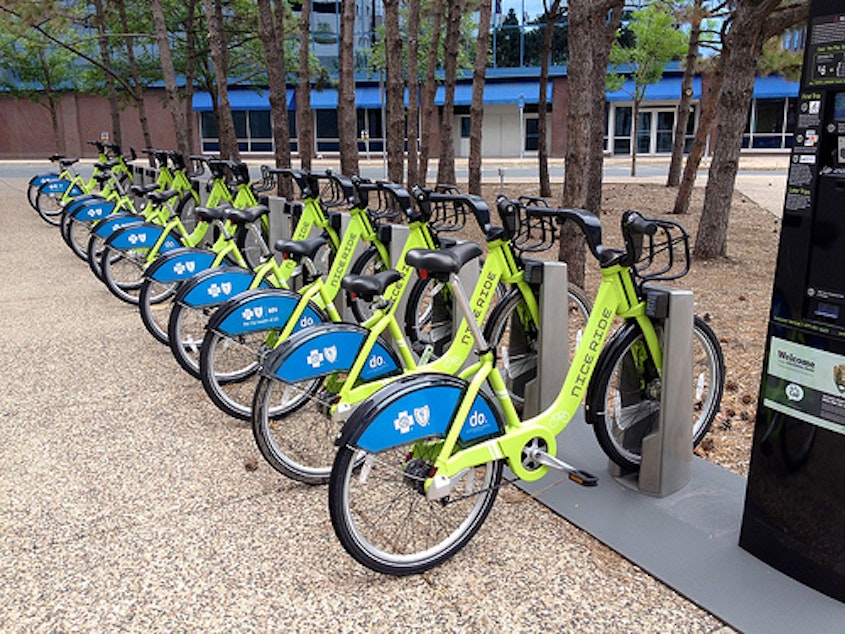Five Lessons For Seattle Bike Share Plan

The plan to create a bike sharing program in Seattle is clicking into a higher gear. Puget Sound Bike Share hopes to launch in 2014 in parts of the University District, Eastlake, Capitol Hill, South Lake Union, Downtown and Queen Anne. Organizers updated Seattle officials Tuesday on their progress and said they hope to hire a vendor by the spring.
Bike sharing is similar to car sharing. Users pay a fee to become a member. Members are able to rent bicycles at stations and return the bikes at different locations.
To get some guidance for the Seattle effort, we spoke with the founder of one of the fastest-growing systems in the US, Nicole Freedman. Freedman started Boston’s program, The Hubway, which launched in 2011. It has 105 stations, more than 1,000 bicycles and 9,000 members. Members have taken about 675,000 trips; more than 500,000 of those trips were taken in the last year. Freedman is also an Olympic cyclist and has studied city planning at MIT and Stanford.
Tip 1: Choose The Right Business Model That Fits Seattle
Boston’s system is operated by a private company, but the system is owned by the city. In fact, city officials view it as part of the transit system. Right now no city money has gone toward the system. Freedman said it’s paid for by advertisements, sponsorships and grants. But as the system expands, the city might be required to spend money on maintenance and operations, like it would for any other transit system.
Sponsored
Seattle’s proposal is slightly different. It would be administered by a nonprofit group, but a private company would run the system’s day-to-day operations.
Tip 2: Locate The Bike Stations Close Together
During the startup phase, planners might be tempted to space out the bike stations to cover as many different neighborhoods as possible. That’s something to avoid. Freedman recommended keeping the stations between 200 to 400 meters apart.
“Let’s say I’m in a meeting in a skyscraper downtown and I have to get back to my office. If I go downstairs, out the door and the nearest station is three blocks away, it’s not worth my time to go walk three blocks, and get on a bike," she said. "If I then have another three block walk at the other end at my office, the efficiencies of saving time and using the bike are pretty much gone because of the walk time.”
Tip 3: Talk To Other Cities
Sponsored
A lot of other cities, including Washington, D.C., Denver and Chicago, have bike sharing programs. Other cities, such as Vancouver, B.C., Portland and San Francisco are still in the planning phases. Freedman says those cities have already done a lot of the groundwork and Seattle could benefit from looking at those different experiences.
Tip 4: Don’t Be Discouraged By Reports Of Hardware And Software Problems
Some systems have had problems with bikes and the software that operates the system. Freedman says Boston was lucky and never had software problems. But she says the problem occurred when one of the nation’s leading vendors switched software developers. Freedman’s point is that the problems should not discourage planners because improvements are always being made. “There’s a lot of great choices out there,” she said. “Doing the homework early will definitely ensure the best system for Seattle.”
Tip 5: Think Creatively About Encouraging Membership
Boston has made it a focus to offer service in poorer neighborhoods as well as more well-to-do ones. But low-income people often don’t have credit cards, which are required to become a member. Freedman said in Boston, they’re looking at social service agencies and the possibility that those groups could sponsor people looking to get a credit card.
Sponsored
Freedman has visited Seattle before and seemed excited about the prospects of a bike sharing program in the city. “I can guarantee that it’s going to be a huge success in Seattle,” she said. “It’s a great city. You’ve got a great culture of people that want to be biking.”

